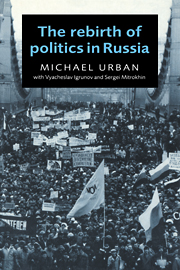Book contents
- Frontmatter
- Contents
- Preface
- Part I The pre-political context
- Part II Perestroika and the return of political life
- Part III Politics and revolution
- Part IV Ground up: politics in post-communist Russia
- 11 Reform, reaction and rebellion: the calamity of the first republic
- 12 Neither democracy nor dictatorship
- Notes
- Index
11 - Reform, reaction and rebellion: the calamity of the first republic
Published online by Cambridge University Press: 22 October 2009
- Frontmatter
- Contents
- Preface
- Part I The pre-political context
- Part II Perestroika and the return of political life
- Part III Politics and revolution
- Part IV Ground up: politics in post-communist Russia
- 11 Reform, reaction and rebellion: the calamity of the first republic
- 12 Neither democracy nor dictatorship
- Notes
- Index
Summary
On the morning after the August coup's defeat, a special session of the Russian Supreme Soviet shelved a motion to replace the national flag with the tricolour – unofficial ensign of the democratic resistance to communism – on the grounds that the Constitution had consigned the designation of state symbols solely to the Congress of People's Deputies. That afternoon, however, El′tsin – who had sat sphinx-like during the Supreme Soviet's deliberations – interrupted the progression of distinguished officials addressing the rally from the back balcony of the White House to put that same question directly to the crowd. Thus an acclamatory chorus adopted the new flag which fluttered from state buildings, including the Kremlin, on the following day. During that evening, Gorbachev appeared before Russia's Supreme Soviet to take unwitting part in a ritual marking the passage of power from the Soviet president to the Russian one. Here, El′tsin publicly humiliated his nemesis, answering his appeal not to blame the CPSU for the coup with a decree signed on the spot that suspended all CPSU activities on Russian soil, bullying him to read aloud the minutes of the recent meeting of the USSR's Cabinet of Ministers at which one after another of his ministers had betrayed him. The television cameras zoomed in on the dramatis personae, capturing a forceful Russian leader in full control of the situation and a spent Soviet president, confused, indecisive and unable to control his own slackened and quivering jaw that testified to his new, subordinate status.
These vignettes at the dawn of Russia's post-communist transformation previewed the authoritarian-populist strategy employed to effect it.
- Type
- Chapter
- Information
- The Rebirth of Politics in Russia , pp. 257 - 290Publisher: Cambridge University PressPrint publication year: 1997



